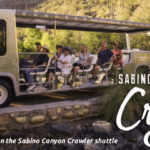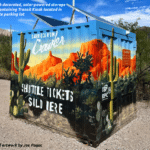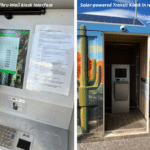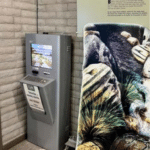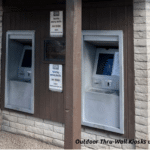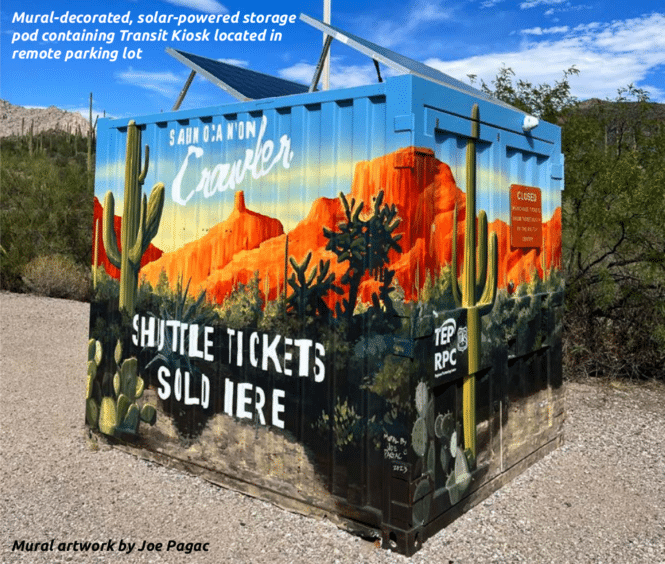
Sabino Canyon Upgrades Ticketing Kiosks
Quite the project in Arizona with a wide variety of ticketing kiosks in a very challenging environment. Outdoor Ticketing Kiosk Arizona. Contact Advanced Kiosks for more info
Overview:
A renowned natural attraction in southern Arizona has integrated a sustainable and tech-savvy approach to enhance the visitor experience. Replacing old diesel shuttles, the Regional Partnering Center introduced the emission-free Sabino Canyon Crawler in 2019. To further streamline the visitor experience, Advanced Kiosks was hand-picked to deploy four modern ticketing kiosks, designed to withstand Arizona’s extreme climate. These kiosks have since processed tickets for over 330,000 visitors, generating $3.8 million in sales. Despite challenges, the initiative has been successful, capturing interest from other organizations aiming to replicate the model.
Outdoor Ticketing Kiosk Picture Gallery
- A group of tourists relaxes inside the open-air Sabino Canyon Crawler shuttle, traveling through a scenic, lush canyon with outdoor ticketing kiosks available nearby. The green shuttle with white text glides beneath the suns warm glow, surrounded by vibrant vegetation and rocky terrain.
- Solar Pod
- Left image: A person engaging with an outdoor through-wall kiosk interface via touchscreen. Right image: A solar-powered ticketing kiosk in a remote lot, featuring a keypad and monitor inside, adorned with desert landscape artwork.
- A digital ticketing kiosk stands against a brick wall, seamlessly blending into its surroundings while displaying transit information. Next to it, an outdoor sign showcases desert scenery with rocks and plants beneath the header The Mountains Gift to the Desert.
- A person stands near two outdoor ticketing kiosks, seamlessly built into a brick structure. One kiosk is marked with a Shuttle Tickets sign. The person wears a hat, beige shirt, and jeans, ready to snag their pass for the journey ahead.
Since the kiosks were launched, they have served more than 330,000 people and have processed more than $3.8 million in ticket sales
Sabino Canyon, located at the base of the Santa Catalina Mountains, is one of the premier natural areas in southern Arizona. The 12,000-acre area features dramatic desert scenery, towering rock formations, and a variety of cacti, including the iconic Saguaro cactus. The backdrop of the mountains adds to the picturesque landscape. With more than 30 miles of groomed trails, Sabino Canyon is a popular
recreation area for both residents and visitors alike. The area has been closed to private vehicles since 1978, but visitors can tour the canyon via the emission-free, open-air Sabino Canyon Crawler. The 1-hour round trip features an audio tour where passengers can plug provided earbuds in at their seat, providing a unique experience for those on the tour while shielding non-shuttle canyon visitors from noise and sounds. The narration is available in English and Spanish. The shuttle system features five Sabino Canyon Crawlers, each with seating space for up to 62 passengers.
THE CHALLENGE
The Regional Partnering Center was established in Pima County by the Regional Council of the Pima Association of Governments, which then established the Sabino Canyon Crawler system in 2019. The RPC, a 501(c) (3), advances policies, practices and solutions to regional planning, environmental and energy challenges in Pima County through research and educational outreach. The Sabino Canyon Crawler replaced the previous diesel-operated shuttles, which were noisy, smelly, and created air pollution.
“I am constantly being called by other members of the US Forest Service, the National Park Service, or other recreation venues to see what we’re doing… They want to know everything about the kiosks.”
Outdoor Thru-Wall Kiosks used for most ticket sales
The RPC initially raised nearly $3 million to get the ball rolling on planning for the shuttle system. Tucson Electric Power provided capital investment for the electric shuttles and electric utility work related to the infrastructure improvements to operate and maintain the system. Those working behind the scenes to launch the project wanted to implement a kiosk-based ticketing system to accompany a web-based system and to simplify the process for visitors who wanted to purchase tickets on site.
After conducting a search process and receiving several bids, the RPC partnered with Concord, N.H.-based Advanced Kiosks.
THE SOLUTION
The RPC implemented four kiosks, with two of Advanced Kiosks’ Outdoor Transit models and two of the company’s Thru-Wall Kiosks. Transit kiosk located inside gift shop
The Transit Kiosk is a state-of-the-art, outdoor kiosk built to withstand extreme climates. This touchscreen kiosk is made with 14-gauge stainless steel and has a cooling and heating system. For sunny days, the sunlight-readable monitor will put out 1100 nits of light.
One of the standalone kiosks is located inside the Sabino Canyon gift shop. The other is stationed inside in a mural-decorated, solar powered storage pod located in a remote parking lot, serving visitors during the area’s busy season.
The Thru-Wall Kiosk is a durable and secure kiosk which is installed through the wall, providing user access outside and maintenance access inside. Easily installed in existing walls or new construction, the form factor lends itself to industrial use and secure access control applications, making it ideal for unmanned facilities.
The RPC wanted the Thru-Wall kiosks specifically to cope with southern Arizona temperatures, which can top 115° F. The organization constructed a shade that can be pulled down to block the effects of the sun, which can make the kiosk keyboards too hot to touch. “When we called, the Thru-Wall Kiosks were still under development,” said Rob Samuelsen, who retired from the Pima Association of Governments but now consults with the RPC. “I think we have the very first two that Advanced Kiosks manufactured.”
THE RESULTS
Since the kiosks were launched, they have served more than 330,000 people and have processed more than $3.8 million in ticket sales. The introduction of self-service kiosks has played a signifcant part in that transition, but it could not have been so successful without total buy-in from Samuelsen and the Crawler team. They have taken ownership of the project from the start, putting in the time and effort to customize the solution to their specifications.
“We’re really proud of what we’ve done,” Samuelsen said. “The previous vendor was 100% cash,” he said. “We’re at 97% debit/credit now. [The kiosks] are a critical component of our business.”
Still, the deployment hasn’t been without its challenges. Bugs seem to enjoy living in the kiosk keyboards, requiring regular cleaning. “I don’t know how they do it, because these things are sealed pretty tight,” Samuelsen said. “I get in them and there are bug carcasses everywhere.”
Solar-powered Transit Kiosk in remote lot
Despite the environmental complications, the kiosks still work great. This is a testament to the high level of quality associated with Advanced Kiosks’ products. Additionally, because Internet service providers don’t see an economic benefit in running DSL lines to the visitor center, the kiosks operate via wireless connectivity.
Thanks to the remote monitoring capabilities of Advanced Kiosks’ Zamok Kiosk Management software, Samuelsen receives a notification on his smartphone in the event connectivity goes down
Because the area is relatively remote, connections can be spotty. Thanks to the remote monitoring capabilities of Advanced Kiosks’ Zamok kiosk management software, Samuelsen receives a notification on his smartphone in the event connectivity goes down. He finds great value in the kiosk notifications and uses them to ensure operations are running smoothly at all hours of the day, as there are regular network disruptions due to the poor internet connection.
Solar Pod
Mural-decorated, solar-powered storage pod containing Transit Kiosk located in remote parking lot Mural artwork by Joe Pagac
Without Zamok’s notification system, Samuelsen would have no way to keep such a close eye on the status of the kiosks. Fortunately, the U.S. Forest Service is planning a major renovation to the visitor center, which should result in an upgrade to the Internet service. Despite the expected effort required to cope with such a harsh environment, Samuelsen is pleased with the way the kiosks have performed. The RPC is about to renew its 5-year contract with the Forest Service to operate the shuttle, and the organization is considering a refresh of the current kiosk models.
He also frequently fields calls from other organizations that are interested in implementing a similar system and want to hear about how it is working for the Crawler system.
“You can see the numbers of how much of our ticket sales comes through the kiosks,” Samuelsen said. “It’s a critical, critical component to our operation.”
Additionally, the success of the kiosk ticketing project has sparked interest from others seeking to duplicate its success in their own operations. “I am constantly being called by other members of the US Forest Service, the National Park Service, or other recreation venues to see what we’re doing,” he said. “They want to know everything about the kiosks.”
Are you ready to start your self-service journey? Reach out to the Advanced Kiosks Sales Department at [email protected], call (603) 865-1000 or contact us on our website.
(603) 865-1000
advancedkiosks.com
